Critical Analysis: Implementation of Concepts for Nursing Care
VerifiedAdded on 2022/10/11
|12
|2903
|6
Report
AI Summary
This report provides a critical analysis of concepts that facilitate nursing care, focusing on their application and relevance to the practice of registered nurses. The introduction emphasizes the importance of patient participation and person-centered care (PCC) as essential aspects of modern healthcare. The report explains four key concepts: belongingness, emotional intelligence, resilience, and communication, providing definitions and highlighting their significance in nursing. It then explores PCC, discussing its principles, benefits, and implementation in healthcare settings. The core of the report critically considers how these concepts assist newly graduated registered nurses in delivering person-centered nursing care. It examines the roles and responsibilities of registered nurses, emphasizing the importance of these concepts in their daily practice, including how belongingness fosters professional identity, emotional intelligence enhances patient interactions, resilience helps manage stress, and effective communication improves patient outcomes. The report references relevant studies to support its claims, offering a comprehensive overview of the factors influencing effective nursing care.
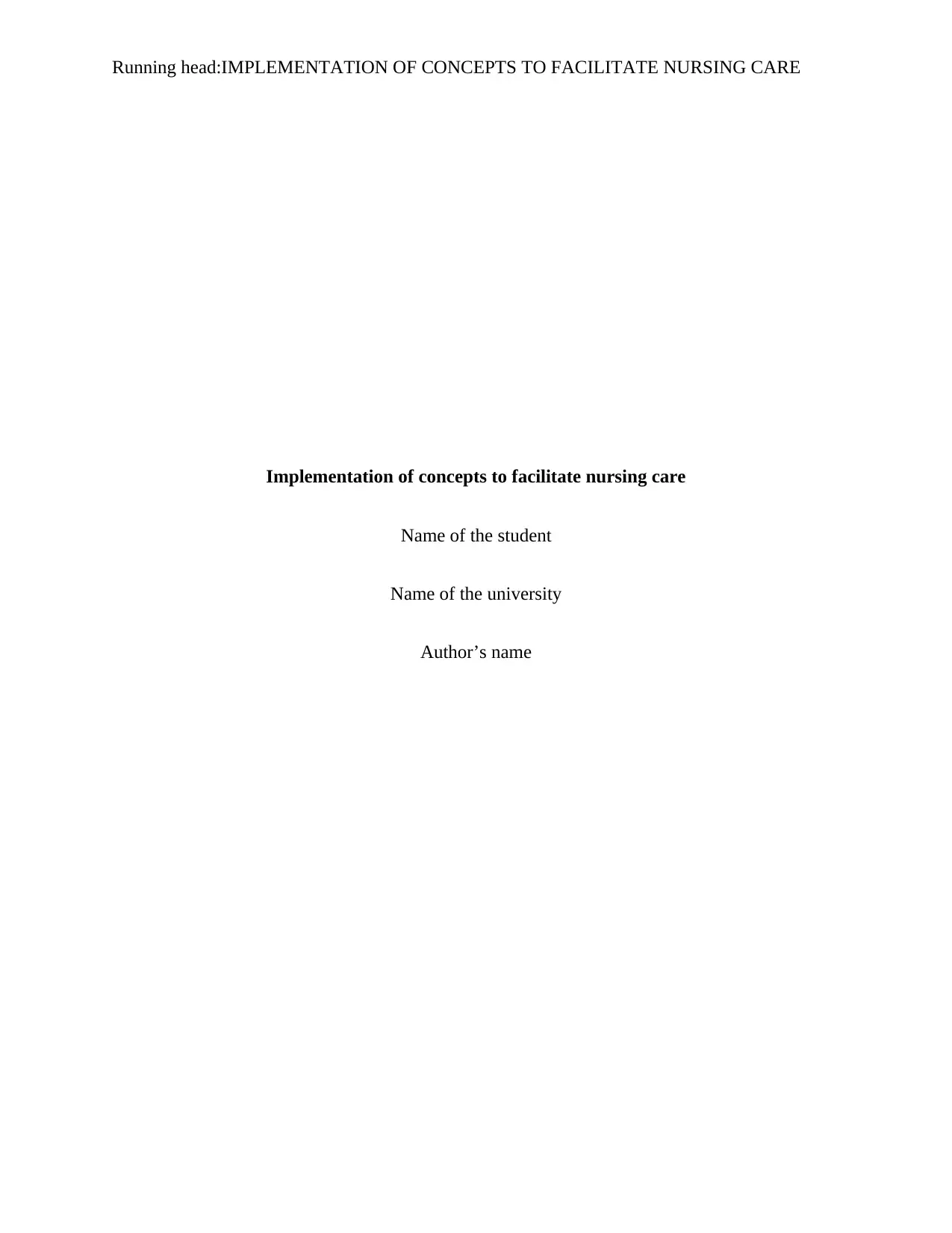
Running head:IMPLEMENTATION OF CONCEPTS TO FACILITATE NURSING CARE
Implementation of concepts to facilitate nursing care
Name of the student
Name of the university
Author’s name
Implementation of concepts to facilitate nursing care
Name of the student
Name of the university
Author’s name
Paraphrase This Document
Need a fresh take? Get an instant paraphrase of this document with our AI Paraphraser
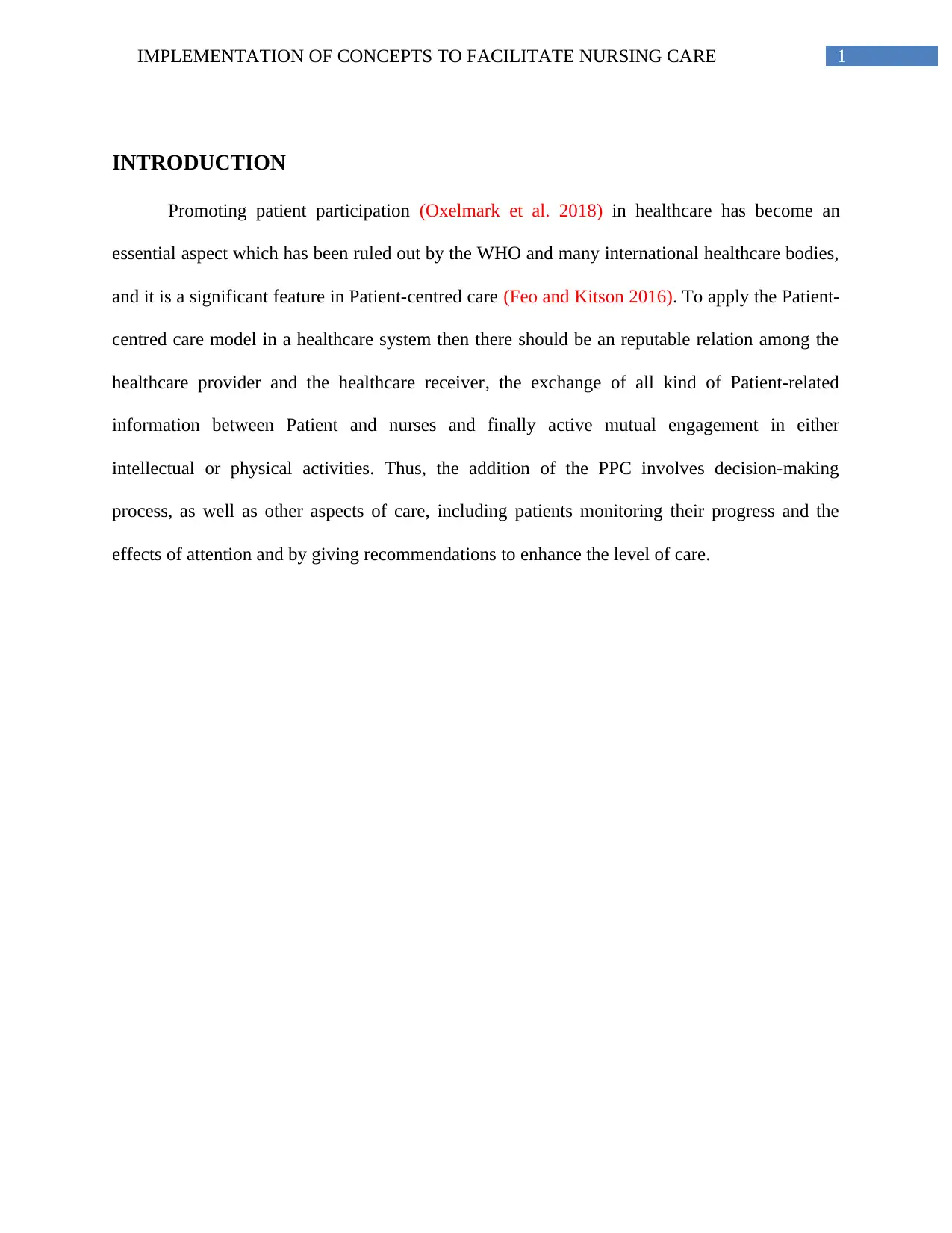
1IMPLEMENTATION OF CONCEPTS TO FACILITATE NURSING CARE
INTRODUCTION
Promoting patient participation (Oxelmark et al. 2018) in healthcare has become an
essential aspect which has been ruled out by the WHO and many international healthcare bodies,
and it is a significant feature in Patient-centred care (Feo and Kitson 2016). To apply the Patient-
centred care model in a healthcare system then there should be an reputable relation among the
healthcare provider and the healthcare receiver, the exchange of all kind of Patient-related
information between Patient and nurses and finally active mutual engagement in either
intellectual or physical activities. Thus, the addition of the PPC involves decision-making
process, as well as other aspects of care, including patients monitoring their progress and the
effects of attention and by giving recommendations to enhance the level of care.
INTRODUCTION
Promoting patient participation (Oxelmark et al. 2018) in healthcare has become an
essential aspect which has been ruled out by the WHO and many international healthcare bodies,
and it is a significant feature in Patient-centred care (Feo and Kitson 2016). To apply the Patient-
centred care model in a healthcare system then there should be an reputable relation among the
healthcare provider and the healthcare receiver, the exchange of all kind of Patient-related
information between Patient and nurses and finally active mutual engagement in either
intellectual or physical activities. Thus, the addition of the PPC involves decision-making
process, as well as other aspects of care, including patients monitoring their progress and the
effects of attention and by giving recommendations to enhance the level of care.
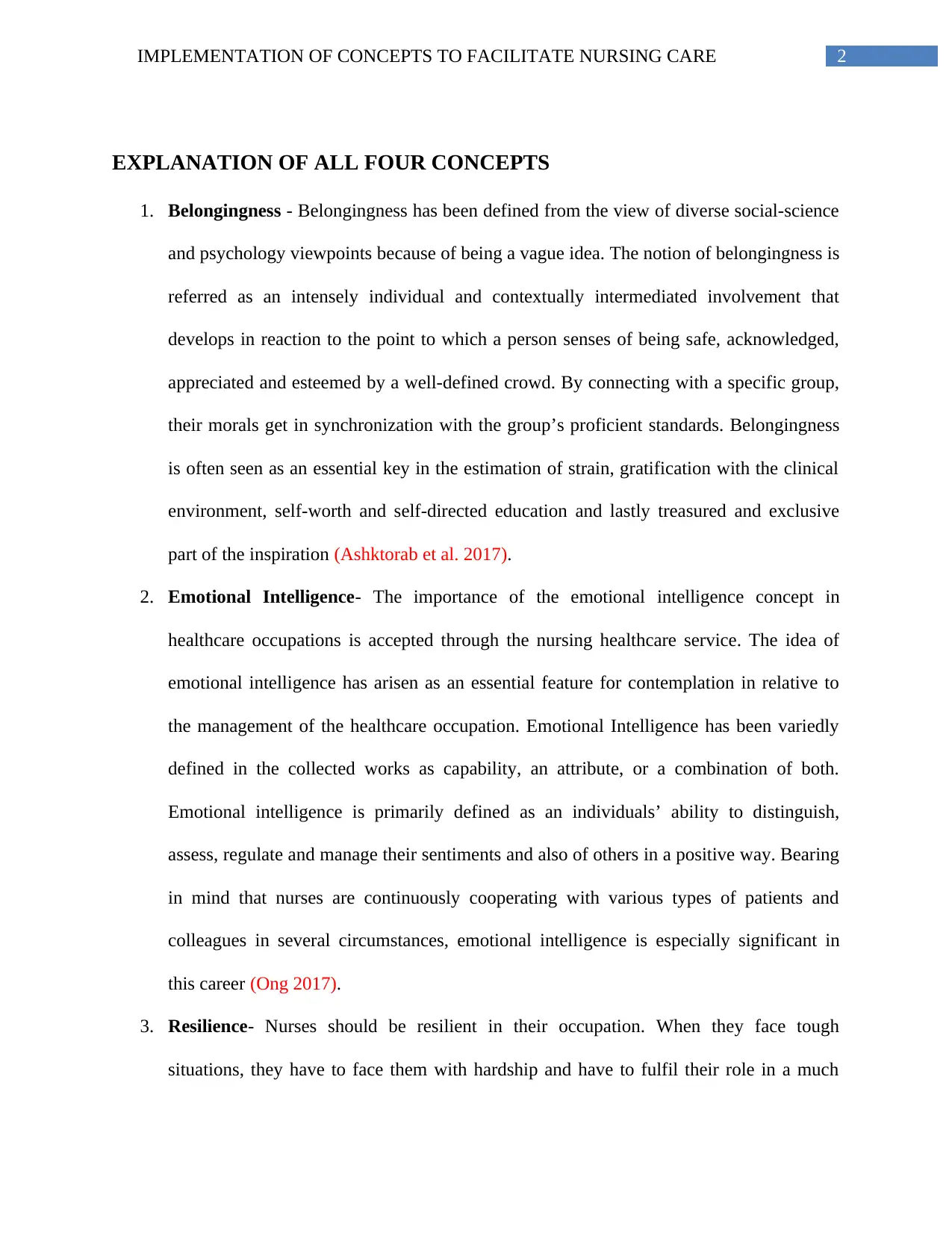
2IMPLEMENTATION OF CONCEPTS TO FACILITATE NURSING CARE
EXPLANATION OF ALL FOUR CONCEPTS
1. Belongingness - Belongingness has been defined from the view of diverse social-science
and psychology viewpoints because of being a vague idea. The notion of belongingness is
referred as an intensely individual and contextually intermediated involvement that
develops in reaction to the point to which a person senses of being safe, acknowledged,
appreciated and esteemed by a well-defined crowd. By connecting with a specific group,
their morals get in synchronization with the group’s proficient standards. Belongingness
is often seen as an essential key in the estimation of strain, gratification with the clinical
environment, self-worth and self-directed education and lastly treasured and exclusive
part of the inspiration (Ashktorab et al. 2017).
2. Emotional Intelligence- The importance of the emotional intelligence concept in
healthcare occupations is accepted through the nursing healthcare service. The idea of
emotional intelligence has arisen as an essential feature for contemplation in relative to
the management of the healthcare occupation. Emotional Intelligence has been variedly
defined in the collected works as capability, an attribute, or a combination of both.
Emotional intelligence is primarily defined as an individuals’ ability to distinguish,
assess, regulate and manage their sentiments and also of others in a positive way. Bearing
in mind that nurses are continuously cooperating with various types of patients and
colleagues in several circumstances, emotional intelligence is especially significant in
this career (Ong 2017).
3. Resilience- Nurses should be resilient in their occupation. When they face tough
situations, they have to face them with hardship and have to fulfil their role in a much
EXPLANATION OF ALL FOUR CONCEPTS
1. Belongingness - Belongingness has been defined from the view of diverse social-science
and psychology viewpoints because of being a vague idea. The notion of belongingness is
referred as an intensely individual and contextually intermediated involvement that
develops in reaction to the point to which a person senses of being safe, acknowledged,
appreciated and esteemed by a well-defined crowd. By connecting with a specific group,
their morals get in synchronization with the group’s proficient standards. Belongingness
is often seen as an essential key in the estimation of strain, gratification with the clinical
environment, self-worth and self-directed education and lastly treasured and exclusive
part of the inspiration (Ashktorab et al. 2017).
2. Emotional Intelligence- The importance of the emotional intelligence concept in
healthcare occupations is accepted through the nursing healthcare service. The idea of
emotional intelligence has arisen as an essential feature for contemplation in relative to
the management of the healthcare occupation. Emotional Intelligence has been variedly
defined in the collected works as capability, an attribute, or a combination of both.
Emotional intelligence is primarily defined as an individuals’ ability to distinguish,
assess, regulate and manage their sentiments and also of others in a positive way. Bearing
in mind that nurses are continuously cooperating with various types of patients and
colleagues in several circumstances, emotional intelligence is especially significant in
this career (Ong 2017).
3. Resilience- Nurses should be resilient in their occupation. When they face tough
situations, they have to face them with hardship and have to fulfil their role in a much
⊘ This is a preview!⊘
Do you want full access?
Subscribe today to unlock all pages.

Trusted by 1+ million students worldwide
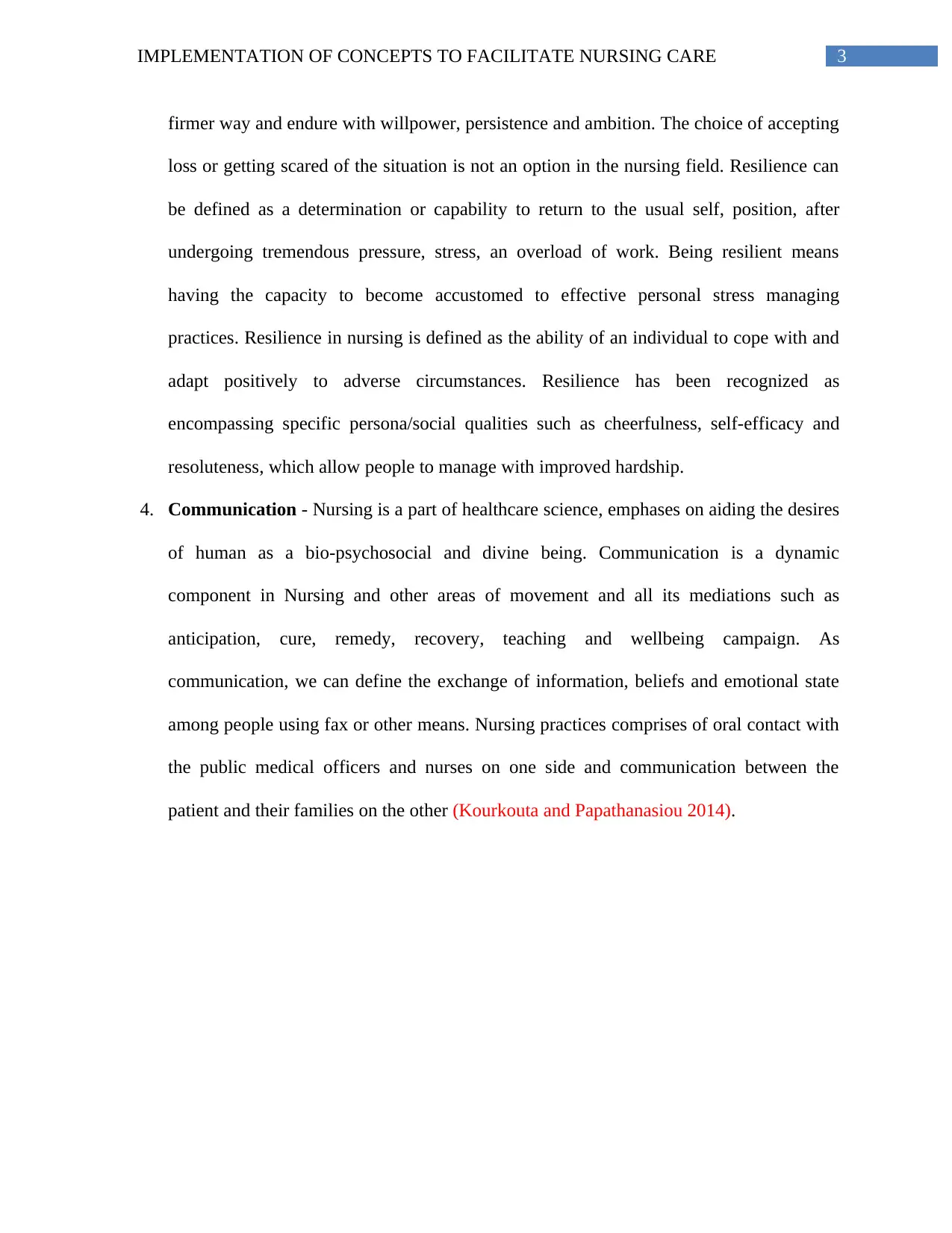
3IMPLEMENTATION OF CONCEPTS TO FACILITATE NURSING CARE
firmer way and endure with willpower, persistence and ambition. The choice of accepting
loss or getting scared of the situation is not an option in the nursing field. Resilience can
be defined as a determination or capability to return to the usual self, position, after
undergoing tremendous pressure, stress, an overload of work. Being resilient means
having the capacity to become accustomed to effective personal stress managing
practices. Resilience in nursing is defined as the ability of an individual to cope with and
adapt positively to adverse circumstances. Resilience has been recognized as
encompassing specific persona/social qualities such as cheerfulness, self-efficacy and
resoluteness, which allow people to manage with improved hardship.
4. Communication - Nursing is a part of healthcare science, emphases on aiding the desires
of human as a bio-psychosocial and divine being. Communication is a dynamic
component in Nursing and other areas of movement and all its mediations such as
anticipation, cure, remedy, recovery, teaching and wellbeing campaign. As
communication, we can define the exchange of information, beliefs and emotional state
among people using fax or other means. Nursing practices comprises of oral contact with
the public medical officers and nurses on one side and communication between the
patient and their families on the other (Kourkouta and Papathanasiou 2014).
firmer way and endure with willpower, persistence and ambition. The choice of accepting
loss or getting scared of the situation is not an option in the nursing field. Resilience can
be defined as a determination or capability to return to the usual self, position, after
undergoing tremendous pressure, stress, an overload of work. Being resilient means
having the capacity to become accustomed to effective personal stress managing
practices. Resilience in nursing is defined as the ability of an individual to cope with and
adapt positively to adverse circumstances. Resilience has been recognized as
encompassing specific persona/social qualities such as cheerfulness, self-efficacy and
resoluteness, which allow people to manage with improved hardship.
4. Communication - Nursing is a part of healthcare science, emphases on aiding the desires
of human as a bio-psychosocial and divine being. Communication is a dynamic
component in Nursing and other areas of movement and all its mediations such as
anticipation, cure, remedy, recovery, teaching and wellbeing campaign. As
communication, we can define the exchange of information, beliefs and emotional state
among people using fax or other means. Nursing practices comprises of oral contact with
the public medical officers and nurses on one side and communication between the
patient and their families on the other (Kourkouta and Papathanasiou 2014).
Paraphrase This Document
Need a fresh take? Get an instant paraphrase of this document with our AI Paraphraser
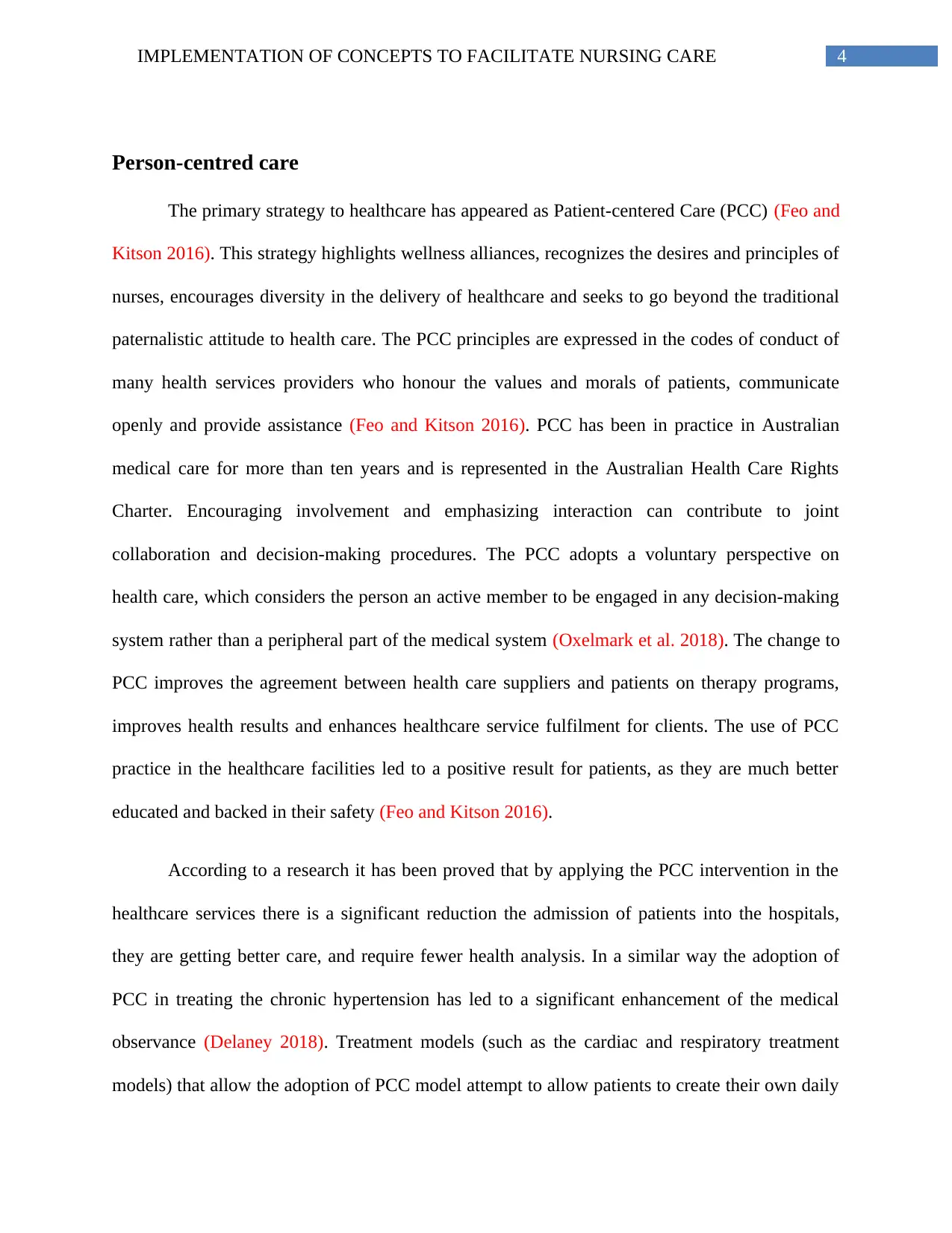
4IMPLEMENTATION OF CONCEPTS TO FACILITATE NURSING CARE
Person-centred care
The primary strategy to healthcare has appeared as Patient-centered Care (PCC) (Feo and
Kitson 2016). This strategy highlights wellness alliances, recognizes the desires and principles of
nurses, encourages diversity in the delivery of healthcare and seeks to go beyond the traditional
paternalistic attitude to health care. The PCC principles are expressed in the codes of conduct of
many health services providers who honour the values and morals of patients, communicate
openly and provide assistance (Feo and Kitson 2016). PCC has been in practice in Australian
medical care for more than ten years and is represented in the Australian Health Care Rights
Charter. Encouraging involvement and emphasizing interaction can contribute to joint
collaboration and decision-making procedures. The PCC adopts a voluntary perspective on
health care, which considers the person an active member to be engaged in any decision-making
system rather than a peripheral part of the medical system (Oxelmark et al. 2018). The change to
PCC improves the agreement between health care suppliers and patients on therapy programs,
improves health results and enhances healthcare service fulfilment for clients. The use of PCC
practice in the healthcare facilities led to a positive result for patients, as they are much better
educated and backed in their safety (Feo and Kitson 2016).
According to a research it has been proved that by applying the PCC intervention in the
healthcare services there is a significant reduction the admission of patients into the hospitals,
they are getting better care, and require fewer health analysis. In a similar way the adoption of
PCC in treating the chronic hypertension has led to a significant enhancement of the medical
observance (Delaney 2018). Treatment models (such as the cardiac and respiratory treatment
models) that allow the adoption of PCC model attempt to allow patients to create their own daily
Person-centred care
The primary strategy to healthcare has appeared as Patient-centered Care (PCC) (Feo and
Kitson 2016). This strategy highlights wellness alliances, recognizes the desires and principles of
nurses, encourages diversity in the delivery of healthcare and seeks to go beyond the traditional
paternalistic attitude to health care. The PCC principles are expressed in the codes of conduct of
many health services providers who honour the values and morals of patients, communicate
openly and provide assistance (Feo and Kitson 2016). PCC has been in practice in Australian
medical care for more than ten years and is represented in the Australian Health Care Rights
Charter. Encouraging involvement and emphasizing interaction can contribute to joint
collaboration and decision-making procedures. The PCC adopts a voluntary perspective on
health care, which considers the person an active member to be engaged in any decision-making
system rather than a peripheral part of the medical system (Oxelmark et al. 2018). The change to
PCC improves the agreement between health care suppliers and patients on therapy programs,
improves health results and enhances healthcare service fulfilment for clients. The use of PCC
practice in the healthcare facilities led to a positive result for patients, as they are much better
educated and backed in their safety (Feo and Kitson 2016).
According to a research it has been proved that by applying the PCC intervention in the
healthcare services there is a significant reduction the admission of patients into the hospitals,
they are getting better care, and require fewer health analysis. In a similar way the adoption of
PCC in treating the chronic hypertension has led to a significant enhancement of the medical
observance (Delaney 2018). Treatment models (such as the cardiac and respiratory treatment
models) that allow the adoption of PCC model attempt to allow patients to create their own daily
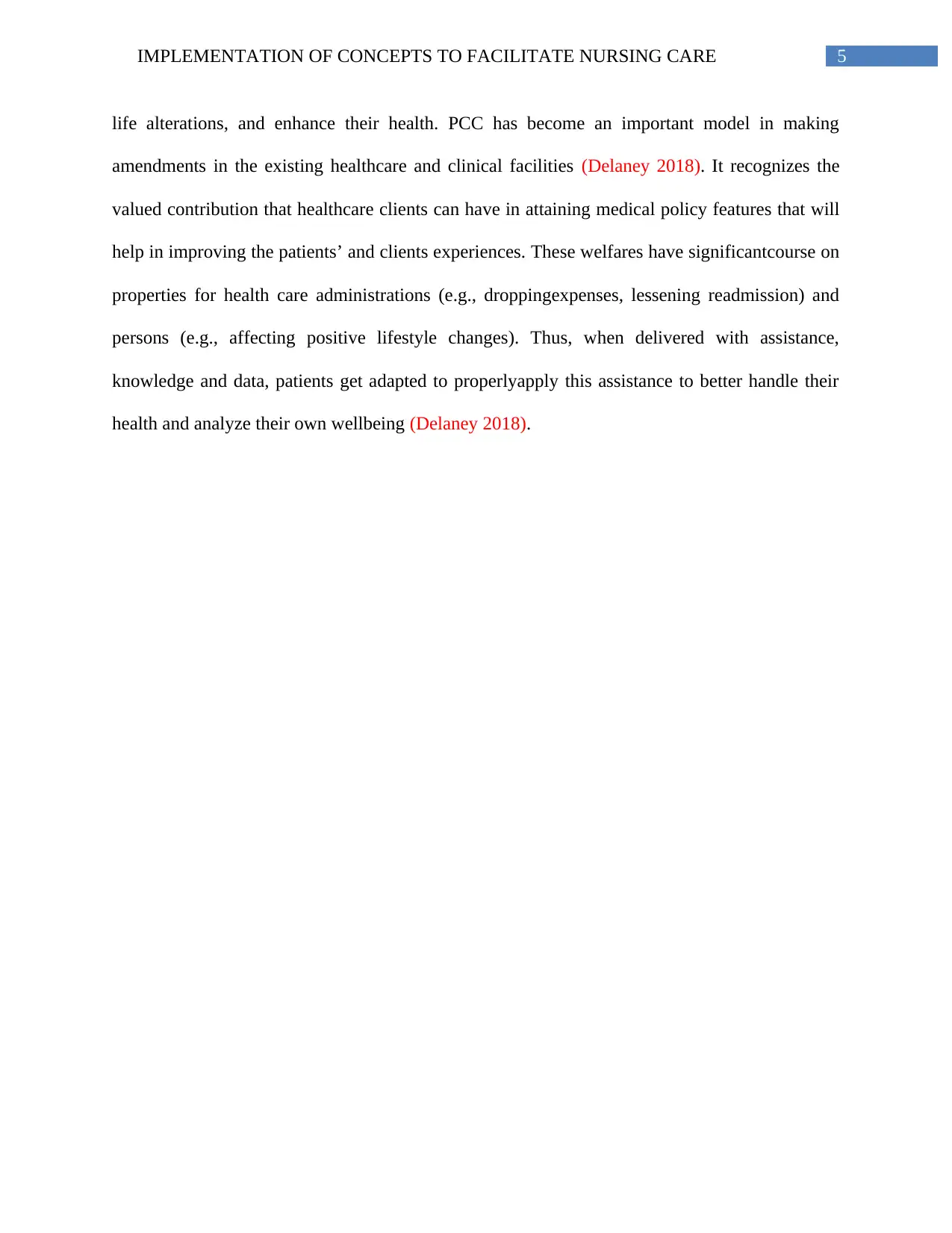
5IMPLEMENTATION OF CONCEPTS TO FACILITATE NURSING CARE
life alterations, and enhance their health. PCC has become an important model in making
amendments in the existing healthcare and clinical facilities (Delaney 2018). It recognizes the
valued contribution that healthcare clients can have in attaining medical policy features that will
help in improving the patients’ and clients experiences. These welfares have significantcourse on
properties for health care administrations (e.g., droppingexpenses, lessening readmission) and
persons (e.g., affecting positive lifestyle changes). Thus, when delivered with assistance,
knowledge and data, patients get adapted to properlyapply this assistance to better handle their
health and analyze their own wellbeing (Delaney 2018).
life alterations, and enhance their health. PCC has become an important model in making
amendments in the existing healthcare and clinical facilities (Delaney 2018). It recognizes the
valued contribution that healthcare clients can have in attaining medical policy features that will
help in improving the patients’ and clients experiences. These welfares have significantcourse on
properties for health care administrations (e.g., droppingexpenses, lessening readmission) and
persons (e.g., affecting positive lifestyle changes). Thus, when delivered with assistance,
knowledge and data, patients get adapted to properlyapply this assistance to better handle their
health and analyze their own wellbeing (Delaney 2018).
⊘ This is a preview!⊘
Do you want full access?
Subscribe today to unlock all pages.

Trusted by 1+ million students worldwide
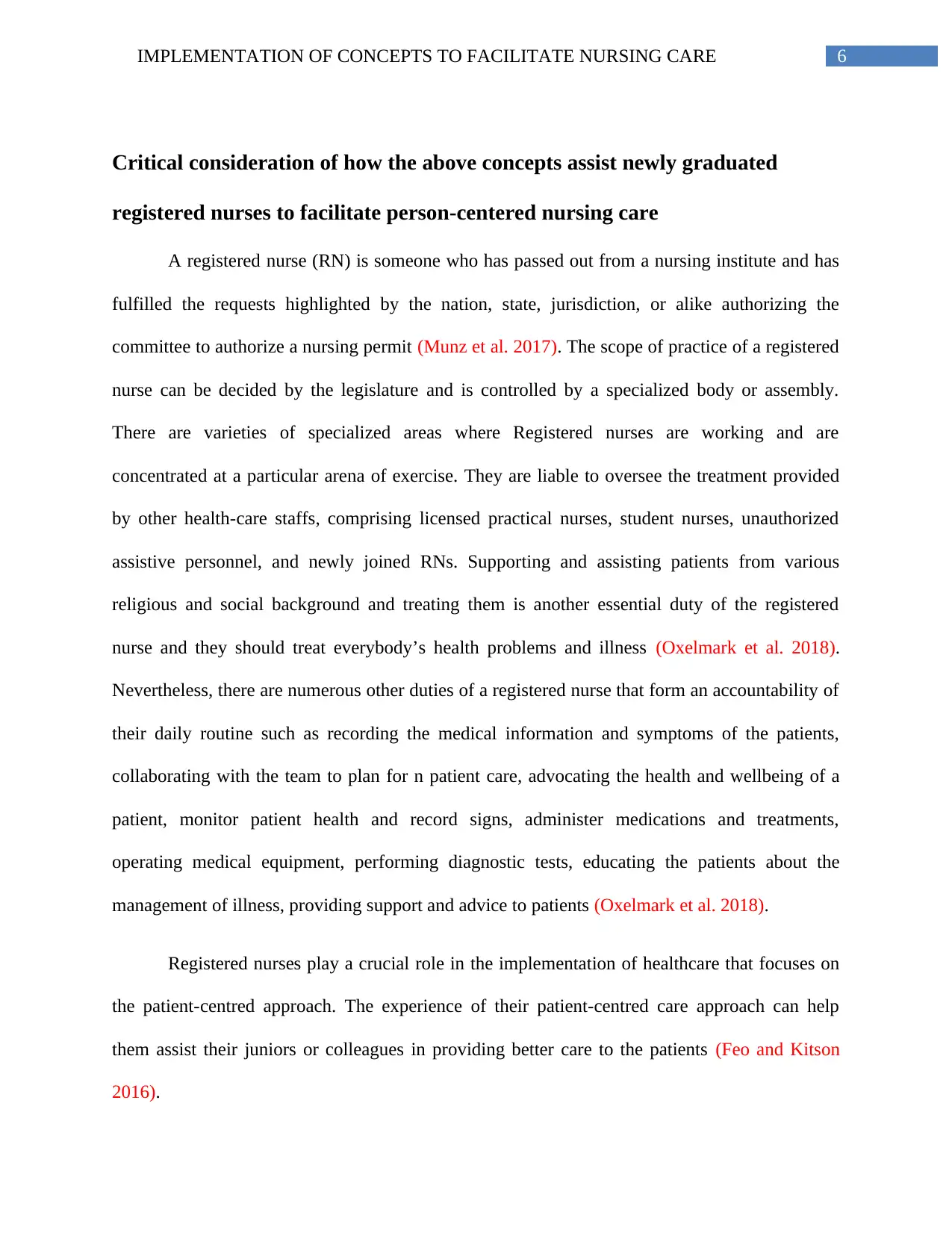
6IMPLEMENTATION OF CONCEPTS TO FACILITATE NURSING CARE
Critical consideration of how the above concepts assist newly graduated
registered nurses to facilitate person-centered nursing care
A registered nurse (RN) is someone who has passed out from a nursing institute and has
fulfilled the requests highlighted by the nation, state, jurisdiction, or alike authorizing the
committee to authorize a nursing permit (Munz et al. 2017). The scope of practice of a registered
nurse can be decided by the legislature and is controlled by a specialized body or assembly.
There are varieties of specialized areas where Registered nurses are working and are
concentrated at a particular arena of exercise. They are liable to oversee the treatment provided
by other health-care staffs, comprising licensed practical nurses, student nurses, unauthorized
assistive personnel, and newly joined RNs. Supporting and assisting patients from various
religious and social background and treating them is another essential duty of the registered
nurse and they should treat everybody’s health problems and illness (Oxelmark et al. 2018).
Nevertheless, there are numerous other duties of a registered nurse that form an accountability of
their daily routine such as recording the medical information and symptoms of the patients,
collaborating with the team to plan for n patient care, advocating the health and wellbeing of a
patient, monitor patient health and record signs, administer medications and treatments,
operating medical equipment, performing diagnostic tests, educating the patients about the
management of illness, providing support and advice to patients (Oxelmark et al. 2018).
Registered nurses play a crucial role in the implementation of healthcare that focuses on
the patient-centred approach. The experience of their patient-centred care approach can help
them assist their juniors or colleagues in providing better care to the patients (Feo and Kitson
2016).
Critical consideration of how the above concepts assist newly graduated
registered nurses to facilitate person-centered nursing care
A registered nurse (RN) is someone who has passed out from a nursing institute and has
fulfilled the requests highlighted by the nation, state, jurisdiction, or alike authorizing the
committee to authorize a nursing permit (Munz et al. 2017). The scope of practice of a registered
nurse can be decided by the legislature and is controlled by a specialized body or assembly.
There are varieties of specialized areas where Registered nurses are working and are
concentrated at a particular arena of exercise. They are liable to oversee the treatment provided
by other health-care staffs, comprising licensed practical nurses, student nurses, unauthorized
assistive personnel, and newly joined RNs. Supporting and assisting patients from various
religious and social background and treating them is another essential duty of the registered
nurse and they should treat everybody’s health problems and illness (Oxelmark et al. 2018).
Nevertheless, there are numerous other duties of a registered nurse that form an accountability of
their daily routine such as recording the medical information and symptoms of the patients,
collaborating with the team to plan for n patient care, advocating the health and wellbeing of a
patient, monitor patient health and record signs, administer medications and treatments,
operating medical equipment, performing diagnostic tests, educating the patients about the
management of illness, providing support and advice to patients (Oxelmark et al. 2018).
Registered nurses play a crucial role in the implementation of healthcare that focuses on
the patient-centred approach. The experience of their patient-centred care approach can help
them assist their juniors or colleagues in providing better care to the patients (Feo and Kitson
2016).
Paraphrase This Document
Need a fresh take? Get an instant paraphrase of this document with our AI Paraphraser
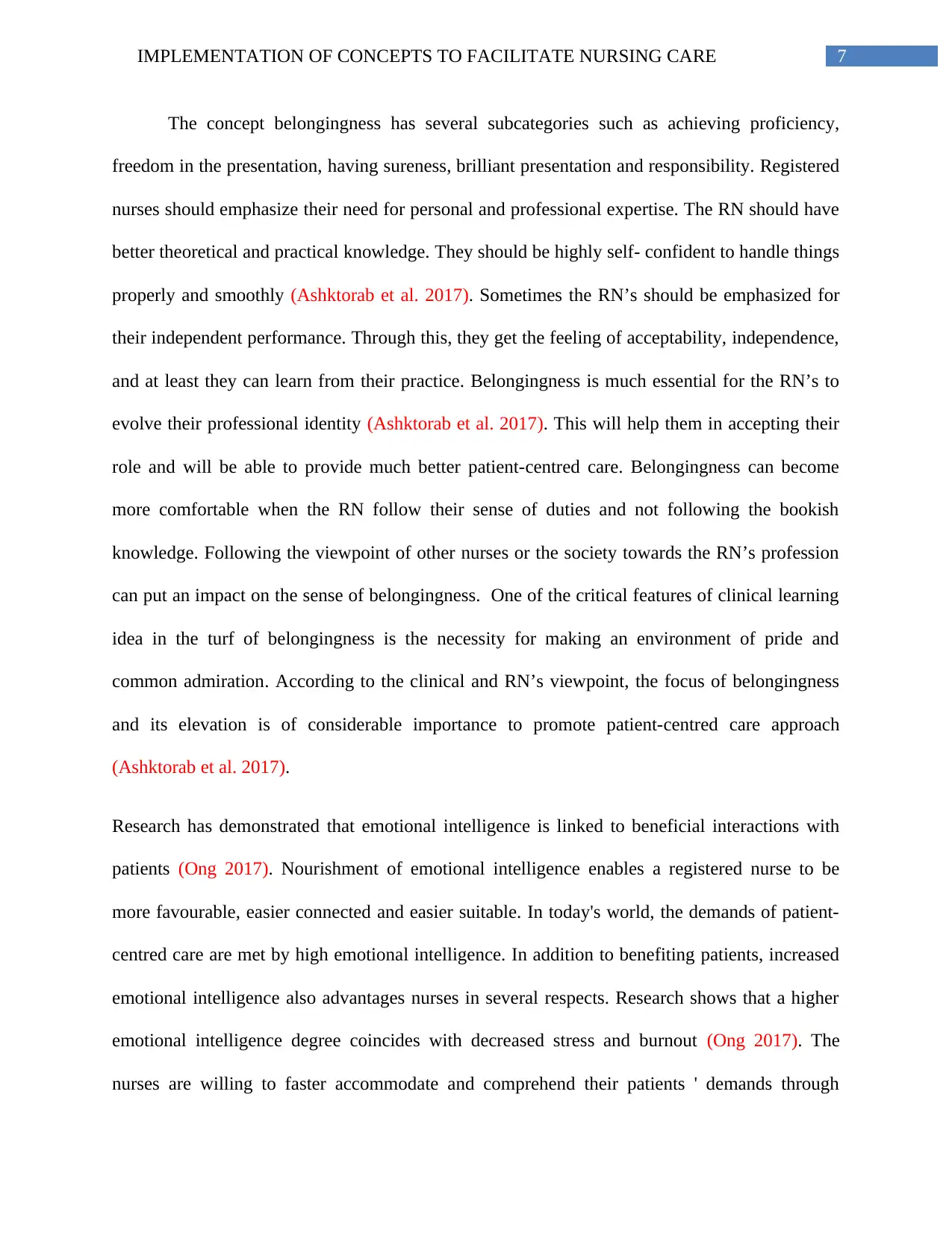
7IMPLEMENTATION OF CONCEPTS TO FACILITATE NURSING CARE
The concept belongingness has several subcategories such as achieving proficiency,
freedom in the presentation, having sureness, brilliant presentation and responsibility. Registered
nurses should emphasize their need for personal and professional expertise. The RN should have
better theoretical and practical knowledge. They should be highly self- confident to handle things
properly and smoothly (Ashktorab et al. 2017). Sometimes the RN’s should be emphasized for
their independent performance. Through this, they get the feeling of acceptability, independence,
and at least they can learn from their practice. Belongingness is much essential for the RN’s to
evolve their professional identity (Ashktorab et al. 2017). This will help them in accepting their
role and will be able to provide much better patient-centred care. Belongingness can become
more comfortable when the RN follow their sense of duties and not following the bookish
knowledge. Following the viewpoint of other nurses or the society towards the RN’s profession
can put an impact on the sense of belongingness. One of the critical features of clinical learning
idea in the turf of belongingness is the necessity for making an environment of pride and
common admiration. According to the clinical and RN’s viewpoint, the focus of belongingness
and its elevation is of considerable importance to promote patient-centred care approach
(Ashktorab et al. 2017).
Research has demonstrated that emotional intelligence is linked to beneficial interactions with
patients (Ong 2017). Nourishment of emotional intelligence enables a registered nurse to be
more favourable, easier connected and easier suitable. In today's world, the demands of patient-
centred care are met by high emotional intelligence. In addition to benefiting patients, increased
emotional intelligence also advantages nurses in several respects. Research shows that a higher
emotional intelligence degree coincides with decreased stress and burnout (Ong 2017). The
nurses are willing to faster accommodate and comprehend their patients ' demands through
The concept belongingness has several subcategories such as achieving proficiency,
freedom in the presentation, having sureness, brilliant presentation and responsibility. Registered
nurses should emphasize their need for personal and professional expertise. The RN should have
better theoretical and practical knowledge. They should be highly self- confident to handle things
properly and smoothly (Ashktorab et al. 2017). Sometimes the RN’s should be emphasized for
their independent performance. Through this, they get the feeling of acceptability, independence,
and at least they can learn from their practice. Belongingness is much essential for the RN’s to
evolve their professional identity (Ashktorab et al. 2017). This will help them in accepting their
role and will be able to provide much better patient-centred care. Belongingness can become
more comfortable when the RN follow their sense of duties and not following the bookish
knowledge. Following the viewpoint of other nurses or the society towards the RN’s profession
can put an impact on the sense of belongingness. One of the critical features of clinical learning
idea in the turf of belongingness is the necessity for making an environment of pride and
common admiration. According to the clinical and RN’s viewpoint, the focus of belongingness
and its elevation is of considerable importance to promote patient-centred care approach
(Ashktorab et al. 2017).
Research has demonstrated that emotional intelligence is linked to beneficial interactions with
patients (Ong 2017). Nourishment of emotional intelligence enables a registered nurse to be
more favourable, easier connected and easier suitable. In today's world, the demands of patient-
centred care are met by high emotional intelligence. In addition to benefiting patients, increased
emotional intelligence also advantages nurses in several respects. Research shows that a higher
emotional intelligence degree coincides with decreased stress and burnout (Ong 2017). The
nurses are willing to faster accommodate and comprehend their patients ' demands through
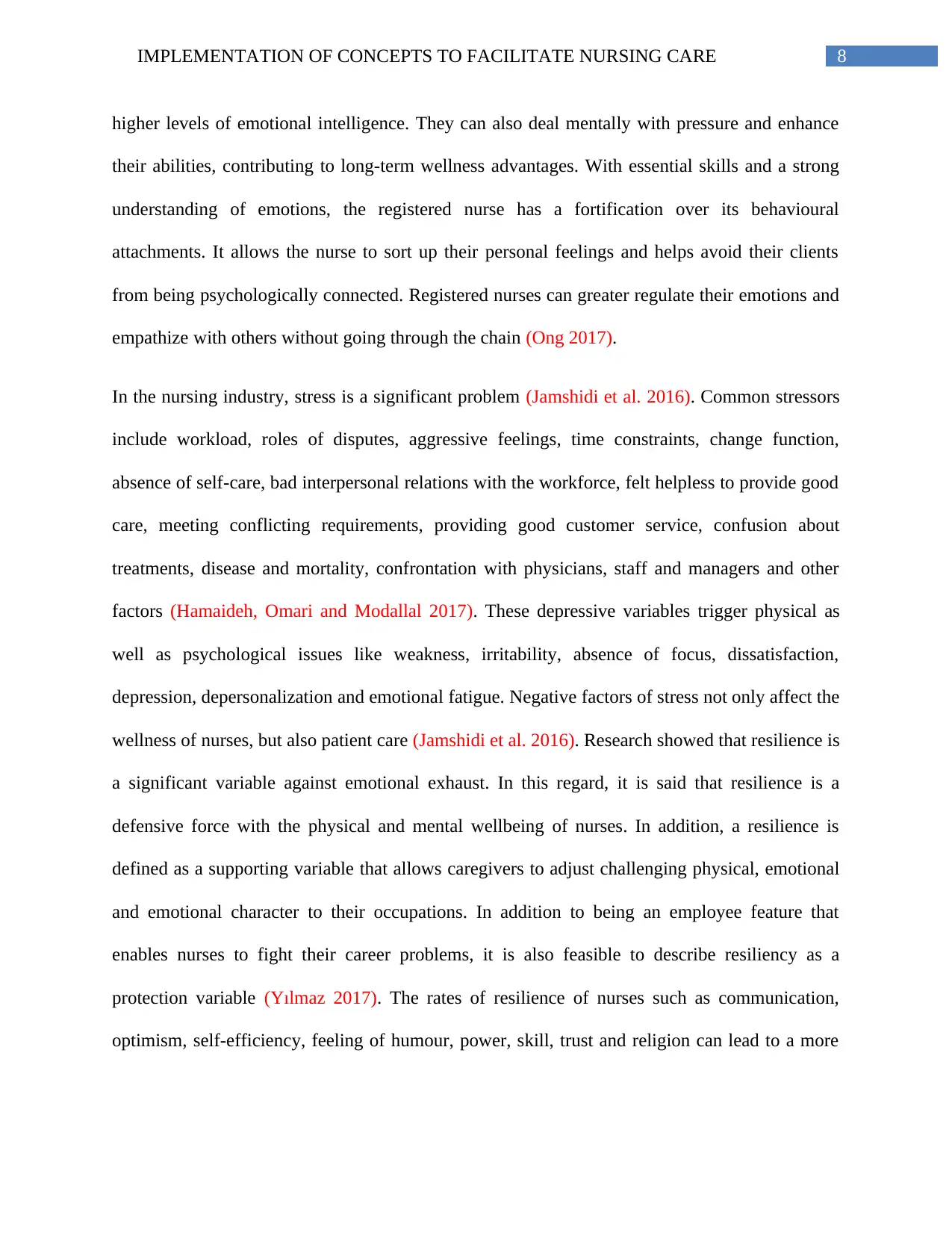
8IMPLEMENTATION OF CONCEPTS TO FACILITATE NURSING CARE
higher levels of emotional intelligence. They can also deal mentally with pressure and enhance
their abilities, contributing to long-term wellness advantages. With essential skills and a strong
understanding of emotions, the registered nurse has a fortification over its behavioural
attachments. It allows the nurse to sort up their personal feelings and helps avoid their clients
from being psychologically connected. Registered nurses can greater regulate their emotions and
empathize with others without going through the chain (Ong 2017).
In the nursing industry, stress is a significant problem (Jamshidi et al. 2016). Common stressors
include workload, roles of disputes, aggressive feelings, time constraints, change function,
absence of self-care, bad interpersonal relations with the workforce, felt helpless to provide good
care, meeting conflicting requirements, providing good customer service, confusion about
treatments, disease and mortality, confrontation with physicians, staff and managers and other
factors (Hamaideh, Omari and Modallal 2017). These depressive variables trigger physical as
well as psychological issues like weakness, irritability, absence of focus, dissatisfaction,
depression, depersonalization and emotional fatigue. Negative factors of stress not only affect the
wellness of nurses, but also patient care (Jamshidi et al. 2016). Research showed that resilience is
a significant variable against emotional exhaust. In this regard, it is said that resilience is a
defensive force with the physical and mental wellbeing of nurses. In addition, a resilience is
defined as a supporting variable that allows caregivers to adjust challenging physical, emotional
and emotional character to their occupations. In addition to being an employee feature that
enables nurses to fight their career problems, it is also feasible to describe resiliency as a
protection variable (Yılmaz 2017). The rates of resilience of nurses such as communication,
optimism, self-efficiency, feeling of humour, power, skill, trust and religion can lead to a more
higher levels of emotional intelligence. They can also deal mentally with pressure and enhance
their abilities, contributing to long-term wellness advantages. With essential skills and a strong
understanding of emotions, the registered nurse has a fortification over its behavioural
attachments. It allows the nurse to sort up their personal feelings and helps avoid their clients
from being psychologically connected. Registered nurses can greater regulate their emotions and
empathize with others without going through the chain (Ong 2017).
In the nursing industry, stress is a significant problem (Jamshidi et al. 2016). Common stressors
include workload, roles of disputes, aggressive feelings, time constraints, change function,
absence of self-care, bad interpersonal relations with the workforce, felt helpless to provide good
care, meeting conflicting requirements, providing good customer service, confusion about
treatments, disease and mortality, confrontation with physicians, staff and managers and other
factors (Hamaideh, Omari and Modallal 2017). These depressive variables trigger physical as
well as psychological issues like weakness, irritability, absence of focus, dissatisfaction,
depression, depersonalization and emotional fatigue. Negative factors of stress not only affect the
wellness of nurses, but also patient care (Jamshidi et al. 2016). Research showed that resilience is
a significant variable against emotional exhaust. In this regard, it is said that resilience is a
defensive force with the physical and mental wellbeing of nurses. In addition, a resilience is
defined as a supporting variable that allows caregivers to adjust challenging physical, emotional
and emotional character to their occupations. In addition to being an employee feature that
enables nurses to fight their career problems, it is also feasible to describe resiliency as a
protection variable (Yılmaz 2017). The rates of resilience of nurses such as communication,
optimism, self-efficiency, feeling of humour, power, skill, trust and religion can lead to a more
⊘ This is a preview!⊘
Do you want full access?
Subscribe today to unlock all pages.

Trusted by 1+ million students worldwide
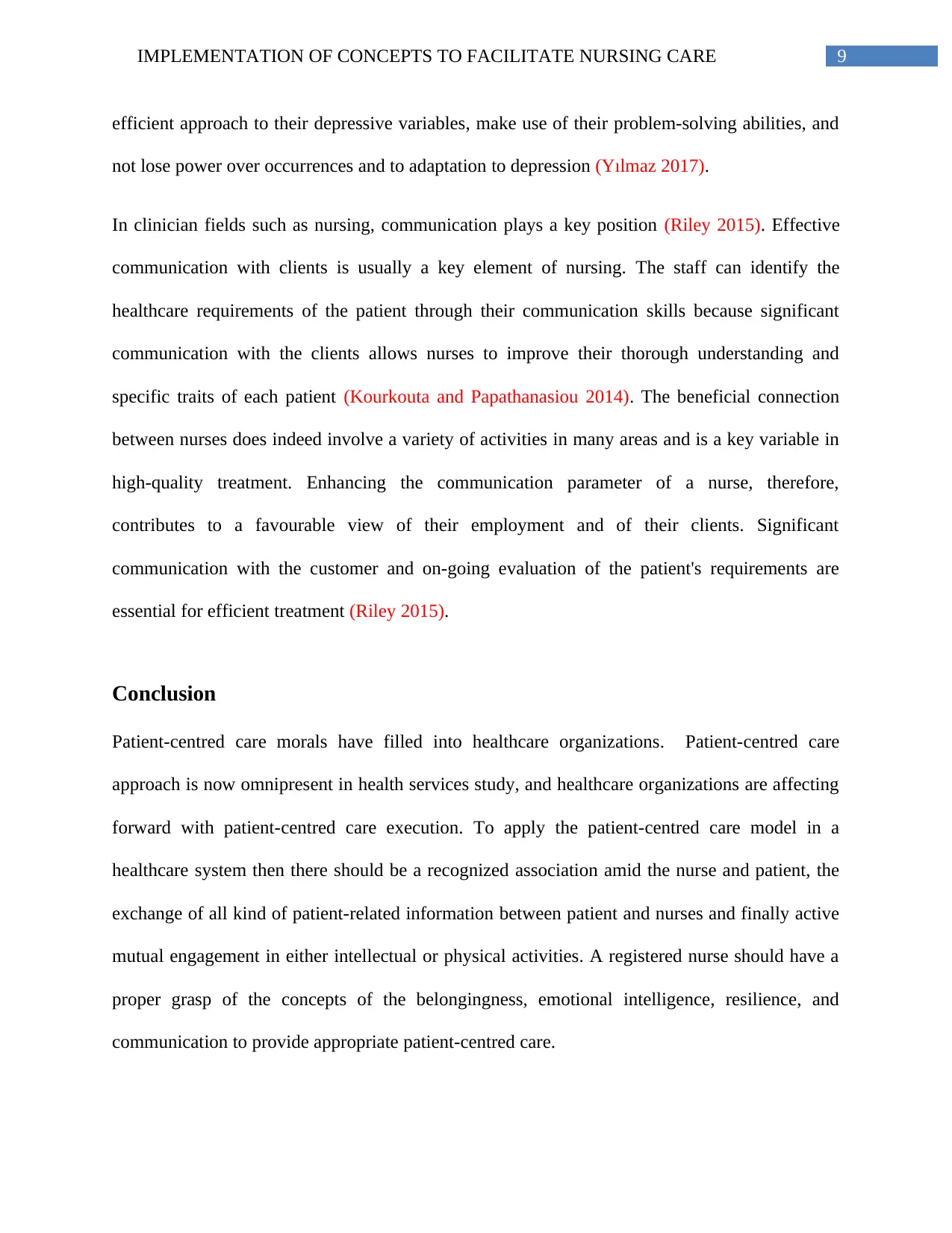
9IMPLEMENTATION OF CONCEPTS TO FACILITATE NURSING CARE
efficient approach to their depressive variables, make use of their problem-solving abilities, and
not lose power over occurrences and to adaptation to depression (Yılmaz 2017).
In clinician fields such as nursing, communication plays a key position (Riley 2015). Effective
communication with clients is usually a key element of nursing. The staff can identify the
healthcare requirements of the patient through their communication skills because significant
communication with the clients allows nurses to improve their thorough understanding and
specific traits of each patient (Kourkouta and Papathanasiou 2014). The beneficial connection
between nurses does indeed involve a variety of activities in many areas and is a key variable in
high-quality treatment. Enhancing the communication parameter of a nurse, therefore,
contributes to a favourable view of their employment and of their clients. Significant
communication with the customer and on-going evaluation of the patient's requirements are
essential for efficient treatment (Riley 2015).
Conclusion
Patient-centred care morals have filled into healthcare organizations. Patient-centred care
approach is now omnipresent in health services study, and healthcare organizations are affecting
forward with patient-centred care execution. To apply the patient-centred care model in a
healthcare system then there should be a recognized association amid the nurse and patient, the
exchange of all kind of patient-related information between patient and nurses and finally active
mutual engagement in either intellectual or physical activities. A registered nurse should have a
proper grasp of the concepts of the belongingness, emotional intelligence, resilience, and
communication to provide appropriate patient-centred care.
efficient approach to their depressive variables, make use of their problem-solving abilities, and
not lose power over occurrences and to adaptation to depression (Yılmaz 2017).
In clinician fields such as nursing, communication plays a key position (Riley 2015). Effective
communication with clients is usually a key element of nursing. The staff can identify the
healthcare requirements of the patient through their communication skills because significant
communication with the clients allows nurses to improve their thorough understanding and
specific traits of each patient (Kourkouta and Papathanasiou 2014). The beneficial connection
between nurses does indeed involve a variety of activities in many areas and is a key variable in
high-quality treatment. Enhancing the communication parameter of a nurse, therefore,
contributes to a favourable view of their employment and of their clients. Significant
communication with the customer and on-going evaluation of the patient's requirements are
essential for efficient treatment (Riley 2015).
Conclusion
Patient-centred care morals have filled into healthcare organizations. Patient-centred care
approach is now omnipresent in health services study, and healthcare organizations are affecting
forward with patient-centred care execution. To apply the patient-centred care model in a
healthcare system then there should be a recognized association amid the nurse and patient, the
exchange of all kind of patient-related information between patient and nurses and finally active
mutual engagement in either intellectual or physical activities. A registered nurse should have a
proper grasp of the concepts of the belongingness, emotional intelligence, resilience, and
communication to provide appropriate patient-centred care.
Paraphrase This Document
Need a fresh take? Get an instant paraphrase of this document with our AI Paraphraser
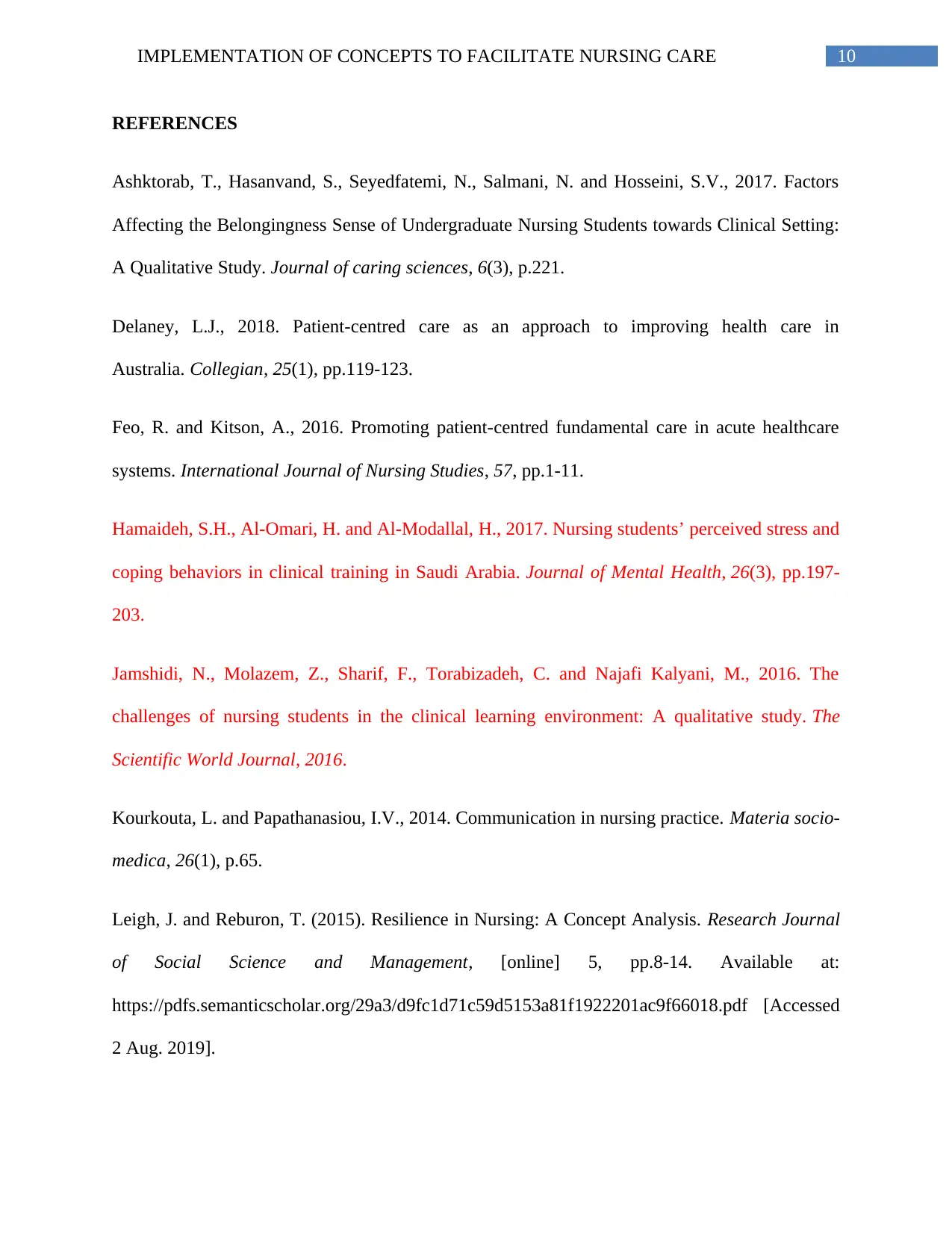
10IMPLEMENTATION OF CONCEPTS TO FACILITATE NURSING CARE
REFERENCES
Ashktorab, T., Hasanvand, S., Seyedfatemi, N., Salmani, N. and Hosseini, S.V., 2017. Factors
Affecting the Belongingness Sense of Undergraduate Nursing Students towards Clinical Setting:
A Qualitative Study. Journal of caring sciences, 6(3), p.221.
Delaney, L.J., 2018. Patient-centred care as an approach to improving health care in
Australia. Collegian, 25(1), pp.119-123.
Feo, R. and Kitson, A., 2016. Promoting patient-centred fundamental care in acute healthcare
systems. International Journal of Nursing Studies, 57, pp.1-11.
Hamaideh, S.H., Al-Omari, H. and Al-Modallal, H., 2017. Nursing students’ perceived stress and
coping behaviors in clinical training in Saudi Arabia. Journal of Mental Health, 26(3), pp.197-
203.
Jamshidi, N., Molazem, Z., Sharif, F., Torabizadeh, C. and Najafi Kalyani, M., 2016. The
challenges of nursing students in the clinical learning environment: A qualitative study. The
Scientific World Journal, 2016.
Kourkouta, L. and Papathanasiou, I.V., 2014. Communication in nursing practice. Materia socio-
medica, 26(1), p.65.
Leigh, J. and Reburon, T. (2015). Resilience in Nursing: A Concept Analysis. Research Journal
of Social Science and Management, [online] 5, pp.8-14. Available at:
https://pdfs.semanticscholar.org/29a3/d9fc1d71c59d5153a81f1922201ac9f66018.pdf [Accessed
2 Aug. 2019].
REFERENCES
Ashktorab, T., Hasanvand, S., Seyedfatemi, N., Salmani, N. and Hosseini, S.V., 2017. Factors
Affecting the Belongingness Sense of Undergraduate Nursing Students towards Clinical Setting:
A Qualitative Study. Journal of caring sciences, 6(3), p.221.
Delaney, L.J., 2018. Patient-centred care as an approach to improving health care in
Australia. Collegian, 25(1), pp.119-123.
Feo, R. and Kitson, A., 2016. Promoting patient-centred fundamental care in acute healthcare
systems. International Journal of Nursing Studies, 57, pp.1-11.
Hamaideh, S.H., Al-Omari, H. and Al-Modallal, H., 2017. Nursing students’ perceived stress and
coping behaviors in clinical training in Saudi Arabia. Journal of Mental Health, 26(3), pp.197-
203.
Jamshidi, N., Molazem, Z., Sharif, F., Torabizadeh, C. and Najafi Kalyani, M., 2016. The
challenges of nursing students in the clinical learning environment: A qualitative study. The
Scientific World Journal, 2016.
Kourkouta, L. and Papathanasiou, I.V., 2014. Communication in nursing practice. Materia socio-
medica, 26(1), p.65.
Leigh, J. and Reburon, T. (2015). Resilience in Nursing: A Concept Analysis. Research Journal
of Social Science and Management, [online] 5, pp.8-14. Available at:
https://pdfs.semanticscholar.org/29a3/d9fc1d71c59d5153a81f1922201ac9f66018.pdf [Accessed
2 Aug. 2019].
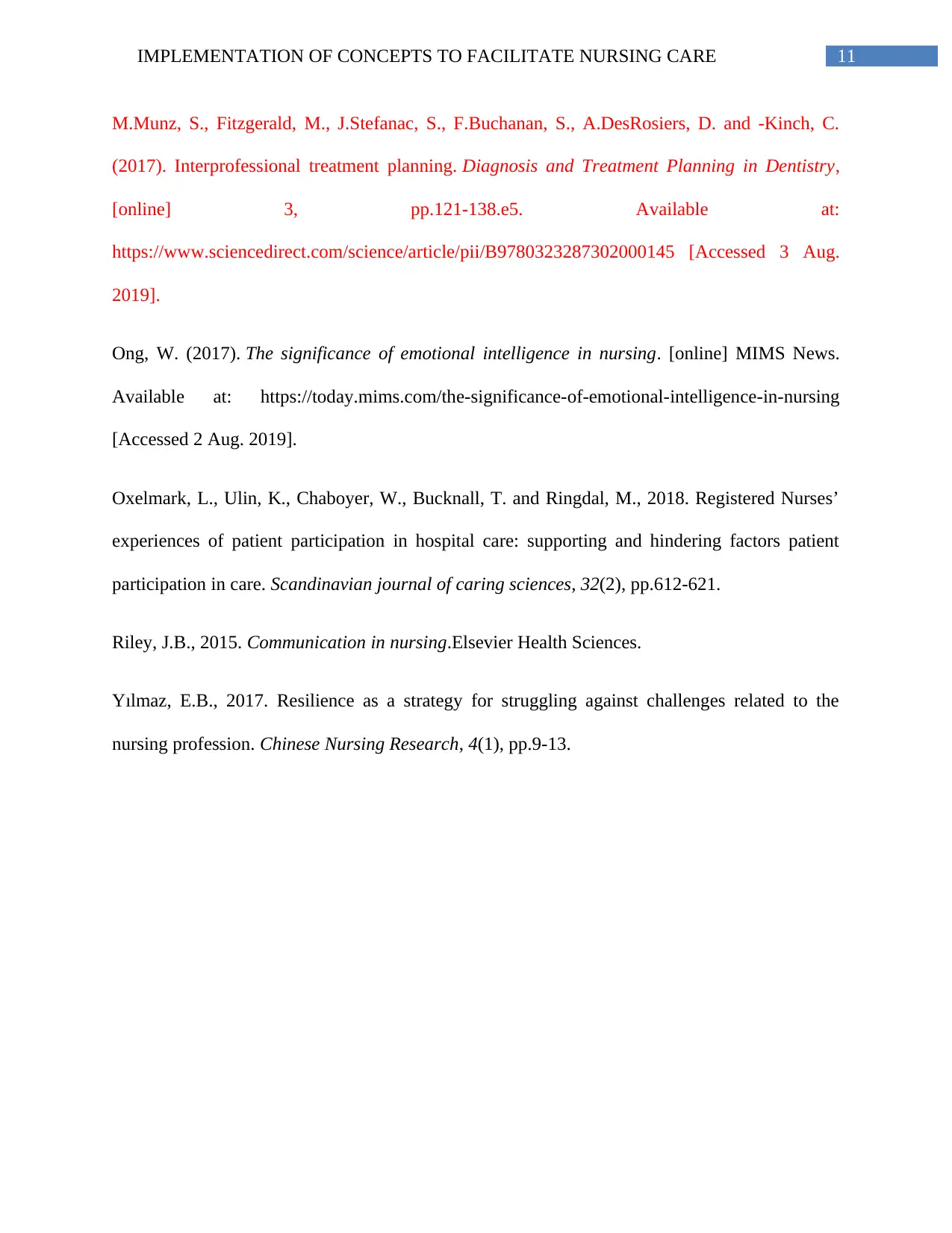
11IMPLEMENTATION OF CONCEPTS TO FACILITATE NURSING CARE
M.Munz, S., Fitzgerald, M., J.Stefanac, S., F.Buchanan, S., A.DesRosiers, D. and -Kinch, C.
(2017). Interprofessional treatment planning. Diagnosis and Treatment Planning in Dentistry,
[online] 3, pp.121-138.e5. Available at:
https://www.sciencedirect.com/science/article/pii/B9780323287302000145 [Accessed 3 Aug.
2019].
Ong, W. (2017). The significance of emotional intelligence in nursing. [online] MIMS News.
Available at: https://today.mims.com/the-significance-of-emotional-intelligence-in-nursing
[Accessed 2 Aug. 2019].
Oxelmark, L., Ulin, K., Chaboyer, W., Bucknall, T. and Ringdal, M., 2018. Registered Nurses’
experiences of patient participation in hospital care: supporting and hindering factors patient
participation in care. Scandinavian journal of caring sciences, 32(2), pp.612-621.
Riley, J.B., 2015. Communication in nursing.Elsevier Health Sciences.
Yılmaz, E.B., 2017. Resilience as a strategy for struggling against challenges related to the
nursing profession. Chinese Nursing Research, 4(1), pp.9-13.
M.Munz, S., Fitzgerald, M., J.Stefanac, S., F.Buchanan, S., A.DesRosiers, D. and -Kinch, C.
(2017). Interprofessional treatment planning. Diagnosis and Treatment Planning in Dentistry,
[online] 3, pp.121-138.e5. Available at:
https://www.sciencedirect.com/science/article/pii/B9780323287302000145 [Accessed 3 Aug.
2019].
Ong, W. (2017). The significance of emotional intelligence in nursing. [online] MIMS News.
Available at: https://today.mims.com/the-significance-of-emotional-intelligence-in-nursing
[Accessed 2 Aug. 2019].
Oxelmark, L., Ulin, K., Chaboyer, W., Bucknall, T. and Ringdal, M., 2018. Registered Nurses’
experiences of patient participation in hospital care: supporting and hindering factors patient
participation in care. Scandinavian journal of caring sciences, 32(2), pp.612-621.
Riley, J.B., 2015. Communication in nursing.Elsevier Health Sciences.
Yılmaz, E.B., 2017. Resilience as a strategy for struggling against challenges related to the
nursing profession. Chinese Nursing Research, 4(1), pp.9-13.
⊘ This is a preview!⊘
Do you want full access?
Subscribe today to unlock all pages.

Trusted by 1+ million students worldwide
1 out of 12
Related Documents
Your All-in-One AI-Powered Toolkit for Academic Success.
+13062052269
info@desklib.com
Available 24*7 on WhatsApp / Email
![[object Object]](/_next/static/media/star-bottom.7253800d.svg)
Unlock your academic potential
Copyright © 2020–2026 A2Z Services. All Rights Reserved. Developed and managed by ZUCOL.





